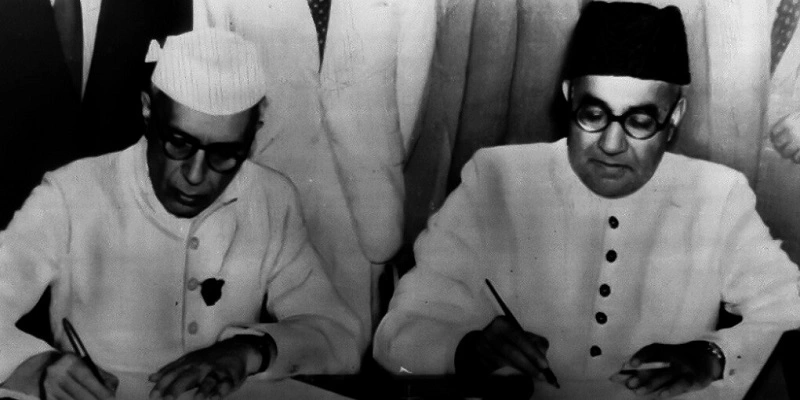Liaquat-Nehru Pact: Bridging Divides and Building Relations Between India and Pakistan
The relations with India between India and Pakistan were extremely antagonistic during the beginning stages of the creation of both countries. They were the main reason for the current situation of unfavorable circumstances. Both countries realized from the beginning that the only way to save themselves was their acceptance of the other as they were, but the rationality needed was swayed by many emotional and narrow-minded war tyrants. But, the leaders of both nations recognized that the circumstances demanded gentle and friendly actions to make people accept the truth about partition even though not everyone was equally loved. Therefore, on April 2nd, 1950, the prime minister from Pakistan, Liaquat Ali Khan, and Indian Prime Minister Jawaharlal Nehru visited Delhi to discuss the challenges of minorities in depth. The meeting lasted six days. April 8th was the day that both leaders signed a deal to resolve this issue, known as the Liaquat-Nehru Pact. This Pact is a declaration of rights for minority communities in both nations. The Pact is also referred to as Delhi Pact.
In the wake of the unanticipated and unjustified urgency displayed by the British in dividing India and creating a new nation, a myriad of issues arose that were tough to solve for the leaders of both countries, but the pace of events took an impact on the weak state system of Pakistan. Following the declaration of independence, many people had to move out of their homes, belongings, and even blood relations were divided. This led to mass migration. Governments in both countries could not resolve the problems of migrants, which caused anger and anger among the displaced thousands of people. However, there was a large number of people who didn't relocate and continued to enjoy being considered minorities. The governments struggling across the border were unable to stop the escalating communal riots because of the inherited weak state apparatus, the conflicting loyalties of the people in charge, and the raging mob rule. People with big goals began to become down on both sides, and bloodletting caused anxiety and madness. During the latter half of the '40s and 1950s, minority riots escalated to a level of disaster. There was a feeling the two countries, India and Pakistan, were likely to engage in another war, separate from the fight for freedom.
The agreement and its benefits.
In the above-described important scenario, The Prime Secretary of Pakistan, Liaquat Ali Khan, traveled to India to meet with Indian Premier Jawaharlal Nehru to find a solution to stop the violence. Both Prime Ministers agreed to sign an agreement known as the Liaquat-Nehru Pact or Delhi Pact.
The Pact was primarily focused on the problems that arose following.
- To promote communal peace.
- To reduce the anxiety of religious minorities on both sides.
- To create a compromise and negotiator environment in both countries to benefit one another.
In the Pact, both administrations agreed that minorities from the two states belonged to the nation where they resided. In the same spirit of the communal settlement , some experts also believe that the agreement guarantees "the absolute indivisibility of the subcontinent."
The Pact also reiterated the governments of both countries to safeguard the fundamental rights of minority groups, e.g., freedom of expression, movement, religion, and occupation. The two governments that signed the Pact also agreed to impose severe punishments on those who are oppressive in society to protect the rights of minorities. However, both countries agreed to establish a minority commission headed by the provincial minister to ensure that no one violated the rules and regulations of the Pact. Both nations agreed to include members of minority communities in their governing bodies. India and Pakistan agreed that the loyalty of minorities should be given to the Government of their existence and that they must also look at the Government of the countries where they live.
Significance.
The immediate impact of this agreement was the release of ever-present tensions and helped the relationship between the two nations. The Pact, however, did not be successful in achieving lasting peace. The reason behind the agreement's failure was the Kashmir dispute, as well as other unresolved issues that were created during the declaration of independence. In contrast, the Indian Government did not implement the preventive and punitive provisions in the agreement. The majority of Hindus weren't ready to be reconciled with Muslims. India launched an offensive of hate against Pakistan and began to accuse Pakistan of being a racist country. Hindus were not treated with respect. Because of the blame game, several communal riots erupted where many people perished and destroyed their property. Also, Pakistan could not enforce the terms of the Pact because of the inherent weaknesses of the country as well as insensitive gestures by India. The Pact was therefore dissolved in 1951.

